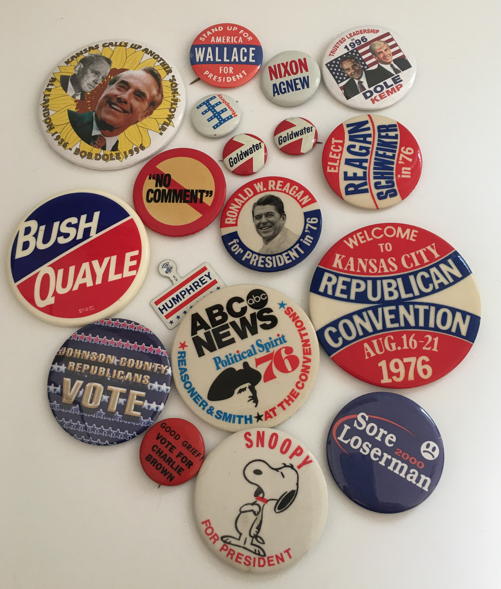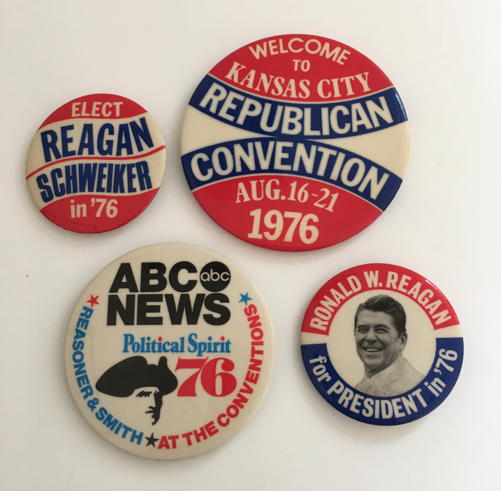A Few Of My Favorite Things By Heather N. Paxton
 Joe Vaughan started collecting political buttons when he was still in grade school – and his collection has grown to include bumper stickers, leaflets, magazine articles, and other souvenirs of the campaign trail. Many show support for presidential candidates, and others highlight the careers of local officials and office seekers. “I was imbued with an interest in public affairs, current events, and history, because that’s always been important in my family,” he said. “So it was natural for me.” Joe got into the habit of watching the news on television when he was very young. Why? “That was supper table conversation.”
Joe Vaughan started collecting political buttons when he was still in grade school – and his collection has grown to include bumper stickers, leaflets, magazine articles, and other souvenirs of the campaign trail. Many show support for presidential candidates, and others highlight the careers of local officials and office seekers. “I was imbued with an interest in public affairs, current events, and history, because that’s always been important in my family,” he said. “So it was natural for me.” Joe got into the habit of watching the news on television when he was very young. Why? “That was supper table conversation.”
The first buttons Joe remembers seeing were for Dwight Eisenhower and Adlai Stevenson, who were opponents in 1956. President Eisenhower had the catchier slogan – “I Like Ike” – and won reelection. The fact that Ike was a native Kansan made it all the better for Joe, who grew up in Kansas City, Kansas.
A family trip further heightened his interest. “We were vacationing in Boston and on Cape Cod in 1960,” he recalled. At the time, Senator John Kennedy had just been nominated for president at the Democratic National Convention. “Being in his home state, there was an awareness of that,” Joe said, noting that he was 12, and keen on the excitement around him.
“Just a month later, in September 1960, my mother picked up two of my friends and me from junior high school. We went to a rally at Fairfax Municipal Airport, where Vice President Nixon appeared,” Joe said. Richard Nixon spoke to the crowd from a podium on a flat-bed truck that was decorated with bunting.
“I met Goldwater in 1968, when the International Order of DeMolay held its convention at Municipal Auditorium,” Joe said. Barry Goldwater had been the 1964 Republican candidate for president, losing to Lyndon Johnson, who was the incumbent. When their paths crossed, Joe was a college student and a member of DeMolay, a Masonic-sponsored youth organization, and Barry, also a member, was the featured speaker. This was Joe’s first one-on-one encounter with a presidential candidate.
After graduating from The University of Kansas, Joe spent many years as a broadcast journalist. One of his early jobs was in Topeka, Kansas, working at WREN for Alf Landon, who had been governor of Kansas and the 1936 Republican candidate for president. More than 45 years later, Joe still remembers a great deal about Governor Landon, who was then in his 80s. His wife, Theo, drove him to the station every day. The walls of his office were lined with drawings by Herblock, who was a well-known political cartoonist. One of his hobbies was riding his horse, Red.
In December 1974, the Democratic Party held a mini-convention in Kansas City. Joe described it as “the first and only,” noting that the purpose was to retrench and prepare for the 1976 election, following George McGovern’s monumental loss to Richard Nixon in 1972 and President Nixon’s resignation in the midst of the Watergate scandal in August 1974. Joe was then working for KCKN, a local radio station. “There were no delegates from the states. It was more nearly a gathering of Democratic Party bigwigs,” he said. Among the regional and national figures Joe saw there were Missouri Senators Stuart Symington and Edward Long, United States Representative Richard Bolling of Missouri, Kansas Governor Robert Docking, and Mayor Charles Wheeler of Kansas City, Missouri. Some were people Joe had known for years. The Dockings were family friends of the Vaughans. Mayor Wheeler was someone Joe often encountered in day-to-day life. “The event lacked buttons, balloons, and banners,” he said, but even without the pageantry, it was meaningful to Joe to be surrounded by people who devoted their lives to the tough work it takes to keep a political party viable.
Joe met President Gerald Ford, Vice President Nelson Rockefeller, Ronald Reagan (later to be a president), Dick Cheney (a future vice president), and dozens of other luminaries at the  Republican National Convention, which was held at Kemper Arena (now the HyVee Arena) in August 1976. Joe still savors Governor Landon’s triumph. Back in 1949, he had advocated recognizing “Red” China – and had been scorned by many. He was vindicated when President Nixon traveled to China in 1972. Because of that, Governor Landon was invited to address the 1976 convention.
Republican National Convention, which was held at Kemper Arena (now the HyVee Arena) in August 1976. Joe still savors Governor Landon’s triumph. Back in 1949, he had advocated recognizing “Red” China – and had been scorned by many. He was vindicated when President Nixon traveled to China in 1972. Because of that, Governor Landon was invited to address the 1976 convention.
President Jimmy Carter came to speak at a trade association convention at the Muehlebach Hotel in about 1978. “The press gaggle was standing at the back of the room, and it just happened that I had a chance to visit with Bob Schieffer, the CBS White House correspondent,” Joe said. Bob Schieffer’s career with CBS would span more than 40 years. The Bob Schieffer School of Communications at Texas Christian University is named for him.
Joe saw John Anderson, a longtime United States representative from Illinois who was a third party candidate for president in 1980, speak at Hoch Auditorium in Lawrence, Kansas. That year, Joe also attended a news conference given by Ronald Reagan, who was soon to be the 40th president. In 1984, he covered the Reagan-Mondale Presidential Debate at Municipal Auditorium. “I think at that time it was pretty obvious Reagan was going to win,” he said, “but I don’t think anyone realized what a landslide it would be.”
In 1988, both of the leading candidates came to Our Town – and Joe was there when they did. Michael Dukakis, who was the governor of Massachusetts, spoke in Independence, Missouri. George Bush, then the vice president, addressed a larger crowd at Penn Valley Community College. Joe recalled seeing Sam Donaldson, the White House correspondent for ABC News, moving energetically through the risers at that event. “Sam always had to make his presence known, whether he was on camera or not,” Joe said, with a laugh. When the votes were tallied, there were more Bush supporters than Dukakis fans. Joe next saw President Bush again at the Kansas City Downtown Airport (now the Charles B. Wheeler Downtown Airport) in 1992. Joe noted that this was a “fly-in,” a brief gathering, similar to Richard Nixon’s visit in September 1960, and that “those always draw the most enthusiastic supporters.”
Longtime United States Senator Bob Dole of Kansas visited the Black & Veatch headquarters in 1996, during his presidential campaign. Joe thinks that was his last sighting of a contender for the nation’s highest office. By then, Joe had left broadcast journalism to focus on his career as a writer and publisher. In addition, particularly in the years after 9/11, the public has had less access to political figures and other celebrities, due to heightened concerns about security.
Of his button collection, Joe said, “A lot of them were just picked up at campaign rallies.” He regrets that future elections are unlikely to feature buttons, because they’re expensive to make. He knows that many people see buttons, bumper stickers, political signs, and the like as ephemeral objects, trinkets to toss at the end of the season. For Joe, though, these are treasures. They connect him with a past that is rich in American history and remind him of the people and events that made it happen.
Also featured in the October 17, 2020 issue of The Independent
By Heather N. Paxton
Features

War Horses for Veterans, founded by Andy and Patricia Brown, held its third annual fundraiser, The Derby Party, on May 4th. More than 400 guests watched the Kentucky Derby race…

Lidia’s was the lovely location for the Symphony League of Kansas City’s annual Spring Luncheon on May 8th. Mandy Burditt and Trish Mayer were the co-chairmen. Nearly 60 members and…

Symphony League members gathered at Amy Volini’s beautiful home recently to kick off preparations for the 2024 Symphony Ball, “NOVA.”Amy and Julie Sykes hosted the fun event, where Ball Chairman…






